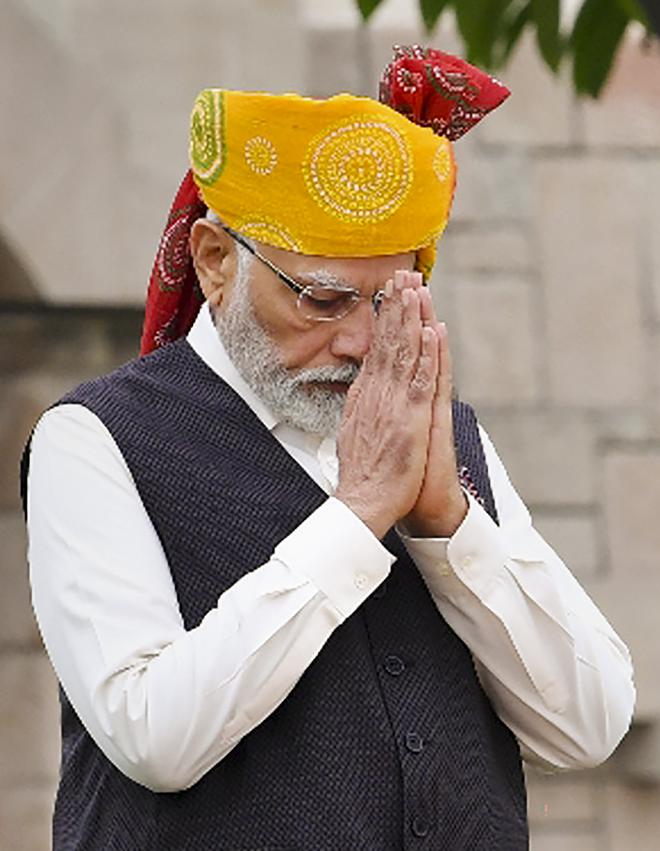Delivering his last independence day speech before the 2024 general election, Prime Minister Narendra Modi made a strong pitch for his return to the ramparts of Red Fort next year.
Noting that he came to power in 2014 promising change, and was elected again in 2019 on the basis of his government’s performance, he said that he would present a report card of India’s achievements in 2024. “Next time, on August 15th, at this very Red Fort I will speak of the achievements of our country, the potential and resolve of our people and their success and self confidence,” Mr. Modi said, in a speech lasting 89 minutes — his fourth longest in 10 years.
Track Independence Day 2023 at Red Fort live updates here
“You would have seen that whichever project our government laid the foundation stone of was also inaugurated by my government, and whatever projects are being initiated this year, their inaugural has also been written into my fate,” the PM said. He added his “guarantee” that in his next term, India would be the third largest economy in the world, an emphatic declaration of his confidence that he will return to power next year.

Referring to Indians as “mere parivarjanon (my family members)“, Mr. Modi said that, in order to develop further, the country should rid itself of three big obstacles: corruption, dynasty politics, and appeasement politics. By referring to the whole country as his family members, the PM drew a line between himself as one of the people, and the nepotism of dynasty-based parties, who only thought in terms of promoting their own family ties.
Peace in Manipur
He reiterated his assurance, after his speech on the motion of no confidence against his government in Parliament, that the country was with the people of Manipur, which has been in the grip of ethnic violence for the last few months.
“In the north-east, especially in Manipur, a period of violence has ensued, many people died, many of our mothers and sisters were disrespected,” he said, adding that there has been news of peace being slowly established in the last few weeks. The Central and State governments were working together to resolve the issue and establish peace, he said.
Development schemes
Among the new initiatives by his government, the Prime Minister announced that interest rate subvention will be given to the urban poor to buy houses. Under the Vishwakarma Yojana, to be launched next month, those with traditional skills and crafts will be allocated ₹1,300 crore to ₹1,500 crore to encourage them in their craft. Many artisan communities belong to the marginalised sections of society.
Mr. Modi also announce a programme to train women in self-help groups to use and repair drones, which will be deployed in agricultural work. “We have also kept a goal of making two crore ‘lakhpati didis (sisters with at least a ₹1 lakh in resources)‘,” he said. The number of Jan Aushadhi Kendras will be increased from 10,000 to 25,000 in the coming years, he added.
Millennium of rejuvenation
Stressing that the trinity of demography, democracy and diversity was the country’s key strength, the Prime Minister said that it was the youth and working professionals who would propel India to strengthen the foundation for a rejuvenation for the next thousand years. India’s future economic power will mainly accrue from Tier-2 and Tier-3 towns and a new middle class which will propel the country into the league of developed nations as early as in 2047, the centenary of independence. “There are no ifs and buts, there is a new confidence in India,” he said.
However, as a warning, Mr. Modi noted that modern India still remembers that the country was attacked, about 1,000 to 1,200 years ago. “One minor king of a small state lost a war, and we did not realise that the consequences of it will last for centuries, a trap of slavery lasting a thousand years,” he said.

A new world order
Giving an account of his government’s work culture, the Prime Minister said that the people’s mandate had given him the strength to reform, and for his government, bureaucrats, and others to perform to transform. As an example, he referred to the 200 crore anti-COVID vaccine doses that were administered to citizens.
Discussing the global situation, Mr. Modi said that the COVID-19 pandemic had seen many countries struggling with inflation, price rise, and disrupted supply chains. He used a new phrase — “Vishwamitra (friend to the world)“ — to describe the image of India that has emerged from the pandemic, as a country which was a force of stability and public good, in areas such as climate change and renewable energy. “In all such global concerns, India’s talk of ‘one world, one sun’ on solar alliances, and ‘one world, one grid’ has found resonance,” he said.







